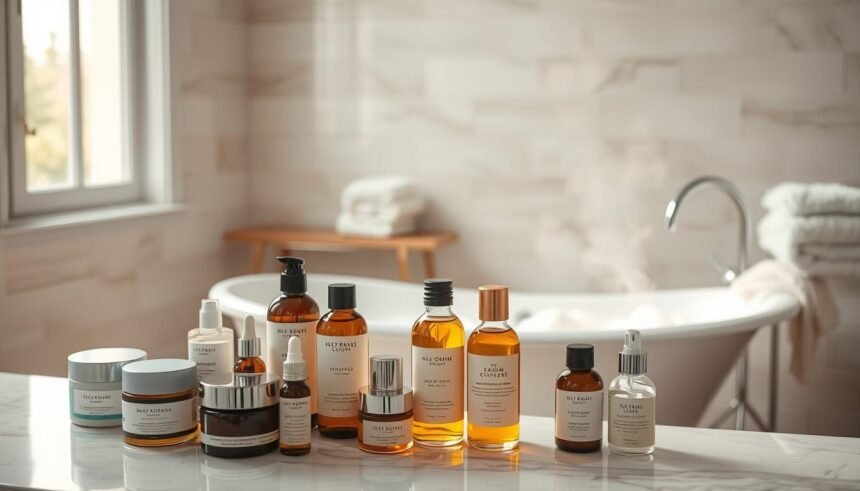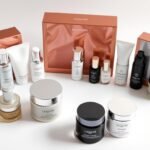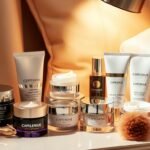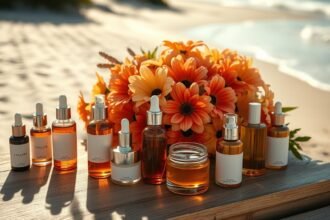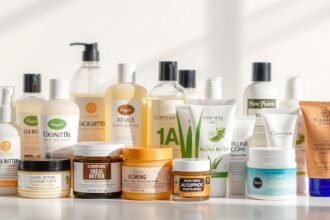Body skincare can be tricky. Many people make mistakes without knowing it. These mistakes can hurt your skin’s health.
It’s not just about using products. You need a plan that fits your skin. Not doing this can stop you from getting the skin you want.
Key Takeaways
- Recognize common skincare mistakes that harm your skin
- Learn how to develop an effective body skincare routine
- Understand the importance of personalized skin protection
- Discover simple strategies to improve skin health
- Avoid unnecessary damage to your skin’s natural barrier
The Importance of Proper Skincare Routine
Creating a good skin care routine is key to healthy, glowing skin. Everyone’s skin is different, needing special care. Natural products are important for skin health and solving problems.
Your skin is complex and needs careful care. Learning about skincare can change how you take care of yourself.
Understanding Your Skin Type
Finding out your skin type is the first step in a good skincare plan. Each skin type needs its own care:
- Oily skin: Needs light, non-clogging products
- Dry skin: Needs rich, moisturizing natural products
- Combination skin: Needs a mix of treatments
- Sensitive skin: Needs soft, safe products
Basic Skincare Fundamentals
A good skin care routine has three main steps:
- Cleansing: Gets rid of dirt and oil
- Moisturizing: Keeps skin hydrated and safe
- Sun Protection: Protects from harmful sun rays
Impact of Daily Habits on Skin Health
What you do every day affects your skin. Things like what you eat, sleep, stress, and drink water matter a lot. Adding healthy habits to your day can make your skin stronger and brighter.
Consistency is key in maintaining healthy, beautiful skin.
Over-Cleansing and Its Negative Effects
Body skincare is more than just washing away dirt. Many think that cleaning a lot makes skin healthier. But, too much cleaning can hurt your skin’s natural shield.
When you take away your skin’s natural oils, it makes more sebum. This starts a bad cycle. It can make your skin:
- More sensitive
- Out of balance with moisture
- Break out and get irritated
- Look older than it should
Knowing your skin type is key to good body skincare. Different skin types need different cleaning:
| Skin Type | Recommended Cleansing Frequency |
| Oily Skin | Once or twice daily |
| Dry Skin | Once daily, best at night |
| Combination Skin | Twice daily with soft cleansers |
To keep your skin hydrated, pick gentle, pH-balanced cleansers. Less is often more in body skincare.
Pro tip: Listen to your skin and adjust your cleansing routine accordingly.
Body Skincare Essentials for Healthy Skin
Creating a good body skincare routine is key for healthy, shiny skin. Choosing the right body moisturizers and butters changes your skincare game. They give your skin the nourishment and protection it needs.
Knowing the basics of body skincare is important. It helps you make a plan that fits your skin’s needs. Your skin needs different care based on its type and what it faces outside.
Essential Products for Daily Care
A good body skincare routine includes:
- Gentle body wash
- Exfoliating scrub (1-2 times weekly)
- Hydrating body moisturizers
- Nourishing body butters
- Specialized treatment products
Choosing the Right Formulations
Choosing the right body moisturizers depends on your skin type. Dry skin loves rich, thick body butters. But oily skin does better with light, non-clogging formulas.
When to Apply Products
When you apply products matters a lot. Put them on right after showering when your skin is still wet. This helps keep moisture in and makes them work better.
Pro tip: Consistency is key in maintaining healthy, glowing skin.
The Danger of Using Too Many Products
Today, many think more products equal better skin. But this is not true. Too many products can upset your skin’s natural balance.
Dermatologists say using too many products can cause:
- Skin irritation and sensitivity
- Potential chemical interactions between ingredients
- Clogged pores and breakouts
- Reduced effectiveness of individual products
Natural skin care is a better choice. These products have fewer ingredients. This means less chance of bad reactions. Quality trumps quantity in skincare.
Here are some tips for your skin care routine:
- Start with 3-4 core products
- Add new products one at a time
- See how your skin reacts to each
- Get rid of products that irritate you
Your skin needs space. A simple routine with natural products works better than a crowded one.
Common Moisturizing Mistakes
Getting your skin to stay hydrated is more than just slapping on moisturizer. Many people make big mistakes that hurt their skin’s health and look.
Every skin type and setting needs its own moisturizing plan. It’s not the same for everyone.
Effective Application Techniques
Learning how to use body moisturizers right is key:
- Put moisturizer on slightly damp skin to keep it in
- Use soft, circular motions when you apply
- Focus on dry spots like elbows and knees
- Choose products that fit your skin type
Optimal Timing and Frequency
When you moisturize matters a lot:
| Skin Type | Recommended Frequency | Best Application Time |
| Dry Skin | 2-3 times daily | Right after you bathe |
| Normal Skin | Once daily | In the morning and at night |
| Oily Skin | Once daily | After you clean your face |
“Consistent moisturizing is the key to maintaining healthy, radiant skin.” – Dermatology Experts
Pro tip: Pick light, non-clogging body moisturizers for the best hydration.
Sun Protection Errors and Solutions
Keeping your skin safe from the sun is very important. Many people make mistakes that hurt their skin. This can cause early aging and health problems.
It’s not just about using sunscreen. Here are some ways to protect your skin better:
- Choose a broad-spectrum sunscreen with at least SPF 30
- Apply sunscreen 15-20 minutes before going outside
- Use about one ounce (like a shot glass full) for your whole body
- Reapply every two hours, especially after swimming or sweating
Some people forget to protect certain areas. Neck, ears, hands, and feet are very prone to sun damage. They can show signs of aging and have a higher risk of skin cancer.
There are different sunscreens for anti-aging. Physical sunscreens like zinc oxide or titanium dioxide block UV rays. Chemical sunscreens absorb them, adding extra protection.
“Prevention is always easier than correction in skincare” – Dermatology Experts
Adding sun protection to your daily routine is simple. Choose moisturizers or makeup with SPF. Wear clothes that cover you and stay in the shade when it’s sunny.
The Truth About Exfoliation
Exfoliation is key in any good anti-aging skincare plan. It can make your skin look better and feel healthier. Not all ways to exfoliate are the same. Knowing the difference can help you get glowing, young-looking skin.
Renewing your skin is a careful job. Getting rid of dead skin cells can make your skin shine. The trick is to clean well but gently.
Chemical vs. Physical Exfoliants
There are different ways to exfoliate, each good for different skin types:
- Chemical Exfoliants:
- Use acids like glycolic or salicylic acid
- Go deep into the skin
- Great for sensitive skin
- Physical Exfoliants:
- Use scrubs with small particles
- Exfoliate the surface right away
- Best for oily or thick skin
Finding the Right Balance
Choosing the right exfoliation method depends on your skin. Too much can hurt your skin, making it red and sore.
| Skin Type | Recommended Frequency | Exfoliation Method |
| Oily Skin | 2-3 times per week | Physical or chemical exfoliants |
| Dry Skin | 1-2 times per week | Gentle chemical exfoliants |
| Sensitive Skin | Once per week | Mild chemical exfoliants |
Pro tip: Always test new exfoliation methods first. Start slow and listen to your skin. This keeps your skin healthy and glowing.
Product Consistency and Patience
Creating good skin care routines is more than buying the right products. It’s about using them every day and being patient.
Many people give up on their skin care too soon. Changing your skin takes time and effort. Most products need 4-6 weeks to show results.
- Serums typically show initial results in 4-6 weeks
- Moisturizers can improve skin texture within 2-3 weeks
- Anti-aging products may require 8-12 weeks for significant changes
Professional dermatologists recommend tracking your skin’s progress through photographs and detailed notes. This helps you see how well products work without getting impatient.
“Good skincare is a marathon, not a sprint” – Dermatology experts
Choose products that fit your skin’s needs. Changing products too often can upset your skin. Keep your routine the same and let your skin adjust.
Remember, everyone’s skin is different. What works fast for one might take longer for another. Being patient, consistent, and getting advice from experts is key to good skin care.
Nighttime Skincare Routine Mistakes
Creating the best skin care routines is not just for the day. Nighttime skincare is key for skin repair and fighting aging. Many people make mistakes at night that harm their skin.
The night is when your skin heals and regenerates. It works hard to fix damage and grow new cells. Using the right night care can make your skin look and feel better.
- Remove all makeup completely before sleeping
- Use targeted night treatments
- Apply products in the correct order
- Pay attention to often-neglected areas like neck and décolletage
Knowing how to care for your skin at night is important. Dermatologists suggest specific steps for better skin repair.
“Your skin does most of its healing work while you sleep. Treat it right, and you’ll wake up looking refreshed.” – Dr. Emily Roberts, Dermatology Specialist
Now, let’s look at common night skincare mistakes and how to fix them:
| Mistake | Consequence | Solution |
| Skipping Cleansing | Clogged Pores | Double Cleanse with Gentle Makeup Remover |
| Applying Products Too Late | Reduced Absorption | Apply Treatments 30 Minutes Before Bed |
| Wrong Product Order | Ineffective Absorption | Lightest to Heaviest Consistency |
Pro tip: Consistency is key in skin care routines. Your nighttime ritual should be as important as your morning regimen.
The Role of Diet in Skin Health
Your diet is key to having healthy, glowing skin. Natural skin care works best with a diet full of good nutrients. This helps your skin from the inside out.
What you eat affects your skin’s look and health a lot. The foods you choose can make your skin look better, feel softer, and stay healthy.
Essential Nutrients for Radiant Skin
- Vitamin A: Helps skin cells grow and repair
- Vitamin C: Makes collagen and fights bad stuff
- Omega-3 Fatty Acids: Keep skin moist and fight inflammation
- Antioxidants: Protect skin from harm
Hydration: The Key to Healthy Skin
Drinking enough water is more important than just using skin care products. It helps get rid of toxins, keeps skin flexible, and stops early aging.
Your skin is a reflection of your internal health – nourish it from within!
Drink 8-10 glasses of water a day. Also, eat foods with lots of water like cucumbers, watermelon, and oranges. This helps keep your skin hydrated.
Conclusion
Body skincare can seem hard to get right. But knowing common mistakes is the first step. This can lead to healthier, more radiant skin.
Every part of body skincare is important. This includes picking the right products and knowing your skin type. A plan that fits you will help a lot.
Consistency is key in body skincare. It makes a big difference in how your skin looks and feels.
Your skin shows how well you’re doing overall. So, take care of it in many ways. This includes eating right, staying hydrated, and protecting it from the environment.
Begin by looking at what you’re doing now. Making small changes can make a big difference. Your path to great skin starts with smart skincare choices.
FAQ
How often should I cleanse my body?
How often you cleanse depends on your skin and how active you are. Most people cleanse once a day, at night. If you have oily skin or work out a lot, cleanse in the morning too. Use a gentle cleanser that keeps your skin healthy.
What’s the best way to choose a body moisturizer?
Pick a moisturizer that fits your skin type and needs. Dry skin needs rich butters like shea. Oily skin does better with light, non-clog formulas. Think about your climate and any skin issues you have.
How important is sun protection for body skincare?
Sun protection is key to avoid aging and skin damage. Use SPF 30 or higher every day. Reapply every two hours outside. Don’t forget your neck, hands, and feet.
How often should I exfoliate my body?
Exfoliate 1-2 times a week, depending on your skin. Sensitive skin needs less, oily skin might need more. Be gentle and don’t overdo it to protect your skin.
Can diet really impact my skin health?
Yes! What you eat affects your skin. Eat foods full of antioxidants and vitamins A, C, and E. Drink lots of water too. Avoid processed foods and sugar.
How long should I stick with a skincare product before deciding it doesn’t work?
Give skincare products 4-6 weeks to see results. Some treatments take 3 months. Be patient and keep using your routine.
What’s the best nighttime skincare routine?
Start by removing makeup and cleansing well. Then, use treatment serums and moisturize. Apply products from thinnest to thickest. Use hydrating or retinol serums for repair at night.
Are natural skincare products always better?
No, not always. Natural products are good, but so are scientifically made ones. Look for effective ingredients, natural or synthetic. Always test new products and see a dermatologist if you’re sensitive.


